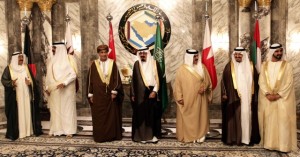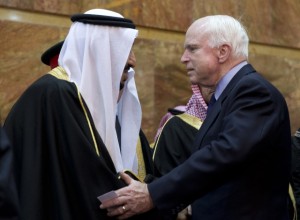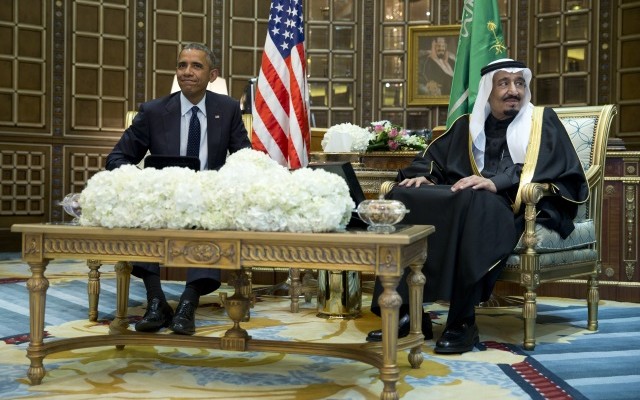Obama is trying hard to convince the Arab Gulf States that a deal with Iran would be safe for them, but they are not convinced. The Saudi king, among others, is not attending the summit.
By: AP and World Israel News Staff

Leaders of the Arab Gulf States. (AP/Hassan Ammar)
The Obama administration’s diplomatic ties with the Arab Gulf countries have taken another turn for the worse, as leaders have canceled their scheduled meeting with President Barack Obama in the US on Thursday.
Saudi Arabia’s King Salman will not attend a Camp David summit of US and allied Arab leaders, his foreign minister, Adel al-Jubeir, said on Sunday.
In a statement, al-Jubeir said the summit Thursday coincides with a humanitarian ceasefire in the conflict in Yemen, where a Saudi-led coalition is fighting Shiite rebels known as Houthis. He said Crown Prince Mohammed bin Nayef, the pro-American Saudi Interior Minister and a lower-level delegate, would lead the Saudi delegation and the king’s son, Deputy Crown Prince Mohammed bin Salman, who is defense minister, will also attend.
The leaders of Oman and the United Arab Emirates (UAE) have also cancelled their attendance, both citing “health issues.”
Obama had planned to meet Salman one-on-one a day before the gathering of leaders at the presidential retreat. The White House did not take his decision to skip the summit as a sign of any substantial disagreement with the US.
Ties between Washington and Riyadh have been cooling since the Obama administration began working toward a nuclear deal with Iran.
Arab leaders have repeatedly expressed fears that a nuclear agreement with Iran and the lifting of sanctions against the Islamic Republic would enable it to produce a nuclear bomb, acquire weapons and upgrade its military. The Sunni Gulf states, who feel directly threatened by Tehran, fear such a deal could offset a nuclear arms race in the Middle East.
Shi’ite Iran and the Sunni countries led by Saudi Arabia are regional rivals waging a proxy war through Syria’s civil war. Saudi Arabia and Iran also support rival political parties in Lebanon, and the kingdom is leading airstrikes against Iran-allied Houthi rebels in Yemen.
Summit to Assuage Fears in Gulf States
At the summit, leaders of Gulf nations, feeling under siege, will be looking for assurances that Obama is supporting them. They feel threatened by Islamic terrorists and are concerned about the chaos in Syria, Iraq and Yemen, which they fear could spill into their countries.
“I think we are looking for some form of security guarantee, given the behavior of Iran in the region, given the rise of the extremist threat,” said Yousef al-Otaiba, the UAE ambassador to the US. “In the past, we have survived with a gentleman’s agreement with the United States about security. I think today, we need something in writing. We need something institutionalized.”
What are the expectations for Obama’s meetings with Gulf Cooperation Council countries — Saudi Arabia, Kuwait, United Arab Emirates, Qatar, Bahrain and Oman?
Weapons sales, a renewed call for a coordinated missile defense system, more joint military exercises, better cooperation on cybersecurity, maritime or border security and coordination od the countries’ defense systems.
The Obama administration is considering arming Sunni Arab Gulf states with advanced missile defense systems and sophisticated weapons in an effort to ease regional fears over a potential nuclear deal with Iran, the Washington Times reported last week.
“I don’t believe there’s a single country [in the council] that doesn’t think a defense shield for the region is a bad idea,” Otaiba said. “The challenge is: How do you turn on a regional defense system when different countries are purchasing different equipment and at different paces? How do you link it? How do you get the radars to talk to each other?”
A high-level Saudi official told the Associated Press in Riyadh that his country wants a defense system and military cooperation similar to what the US affords Israel. The official, who spoke on condition of anonymity because he wasn’t authorized to disclose details of the Saudis’ wish list at the summit, said they also want access to high-tech military equipment, missiles, planes and satellites, as well as more technology and training cooperation with the US.
The US and five other nations are working to complete a deal intended to stop Iran’s pursuit of nuclear weapons in exchange for easing penalties that are choking the Iranian economy. The White House says the Gulf countries would be better off with an agreement that blocks Iran’s path to an atomic weapon.

Senator McCain in Saudi Arabia. (AP/Carolyn Kaster)
Senator John McCain, Republican chairman of the Senate Armed Services Committee, said Obama will have to work hard to convince the Arab allies that they do not need to fear fallout from any nuclear deal.
“Right now they feel that they have no support from this administration, so he has a steep hill to climb,” said McCain, pointing to Saudi Arabia’s decision to act unilaterally in Yemen.
McCain said that’s why the Saudis gave General Lloyd Austin, head of the US Central Command, only “an hour’s notice they were going to strike Yemen.” Saudi Arabia has led airstrikes against Iranian-backed rebels who have toppled the Yemeni government.
Secretary of State John Kerry declined to say exactly what kind of reassurances Obama is prepared to offer at Camp David.
In general terms, Kerry said Friday in Paris that the US wants to strengthen its “security-military relationship” with its Gulf allies and tackle a variety of problems, “foremost of which is the Iranian interference in the affairs of the countries of the region.”
He said US officials were fleshing out commitments that would create a “new security understanding, a new set of security initiatives.”
Senator Lindsey Graham, chairman of the Senate panel overseeing foreign aid, warned against offering a massive arms package in exchange for Gulf nations’ support of a nuclear deal. Graham said he is not opposed to upgrading the military capabilities of Arab allies, but “if it has a hint of being connected to the Iran deal, I will do everything I can to make sure they never get one bullet or one plane.”
Jon Alterman at the Center for Strategic and International Studies in Washington questioned if there is anything the United States can do that would reassure the Gulf States when it comes to Iranian expansionism.
“It seems to me that where they most want reassurance is where the US is both least able and most unwilling to provide it,” he said. “My guess is that the summit is going to leave everybody feeling a little bit unsatisfied.”





